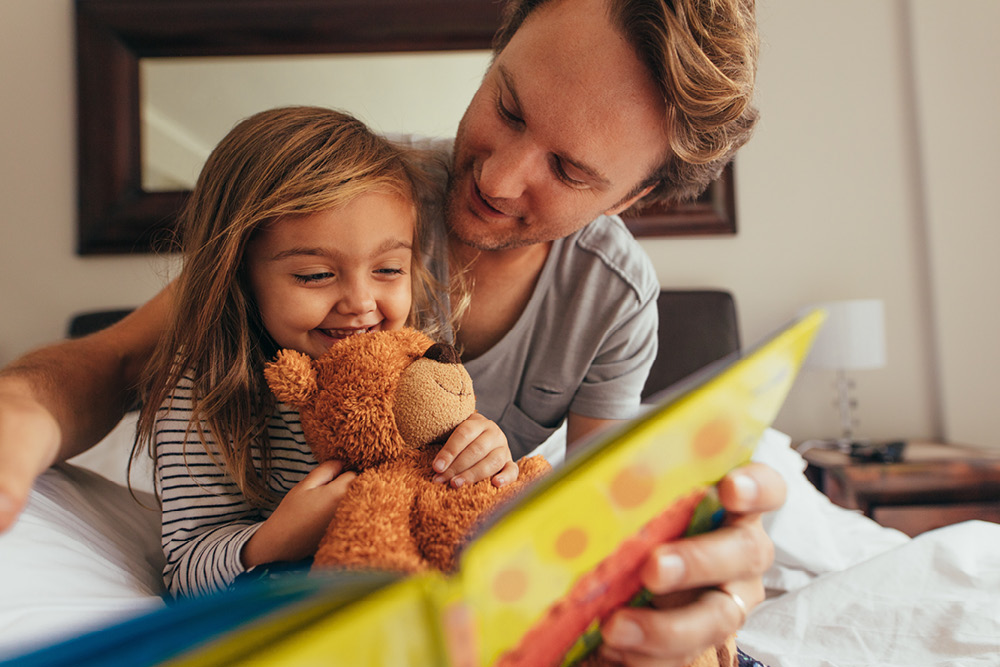 Parenting in this new era of remote working has evolved. “Covid has been an awful time for many people but it’s been a pleasure to see so much of my kids” says James, Managing Director and father of two.
Parenting in this new era of remote working has evolved. “Covid has been an awful time for many people but it’s been a pleasure to see so much of my kids” says James, Managing Director and father of two.
Family life is noisy and busy; it jumps from joyful highs to soul-crushing lows at great speed – and now we’ve brought our working lives into this same hectic environment too.
The opportunity for many of us to work from home long term is a significant change to our social structures and family dynamics. Has the age-old dilemma of wanting stimulating, enjoyable, well-paid work as well as precious time with our children been partially resolved by the advent of remote working? No one is suggesting that you can look after a young child adequately whilst carrying out a job from home, but remote working could offer parents benefits and opportunities.
How can parent-child relationships be improved by hybrid working?
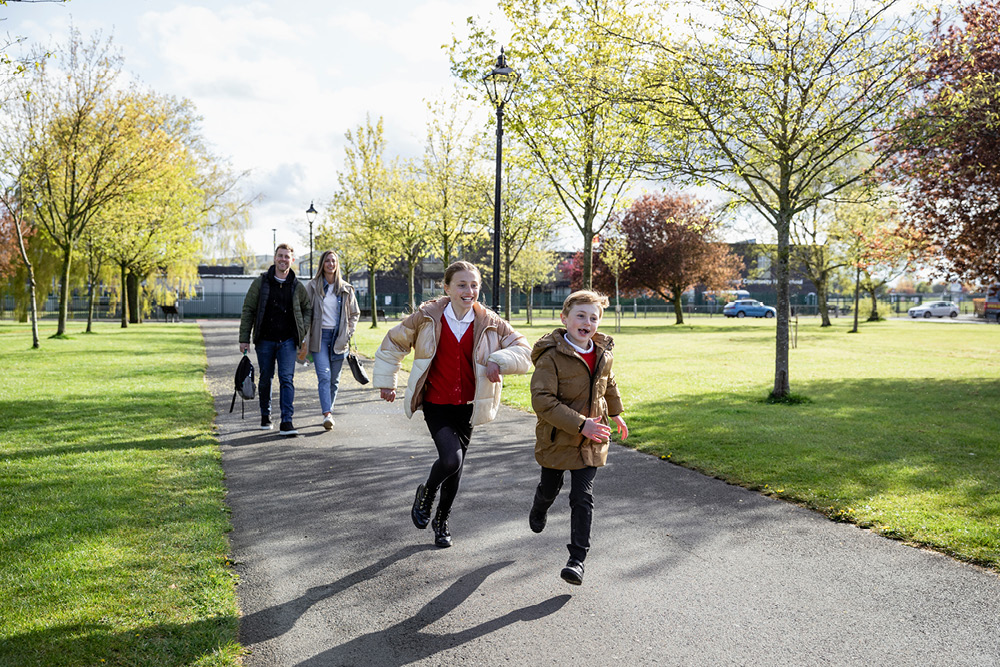
- Reduced commuting time, allowing that time to be spent with the children. An extra two hours per day, two days per week, could add up to 115,200 additional minutes spent together in the first ten years of your child’s life.
- The chance to take children to and from school, meet their teachers and friends and engage more fully in their school lives.
- By building stronger relationships with teenagers, as we are around for crisis mitigation, hugs and the odd laugh, as well as being present to keep a beady eye on homework, amorous encounters, safety and snack consumption. (And why would you want to miss hearing those doors slam?)
- Taking breaks together, a shared lunchtime walk or game can be a simple pleasure.
- Reduced childcare needs and increased time together, as there may be opportunities for working different hours to 9 to 5. (Though an exhausted, over-stretched parent is of course not conducive to anyone’s happiness.)

So let’s hear from hybrid working parents: what has changed and what has stayed the same in family life in this new era of remote working?
Elizabeth, a mum and lecturer at the University of Cambridge
Elizabeth has always been a hybrid worker with research carried out from home and lecturing, tutoring and mentoring carried out at the university. But her city lawyer husband is new to working from home, and it has been a significant improvement to family life:
“He would never be home pre-Covid to eat dinner with the kids. Always at the office. Now that he’s working from home we can actually see each other a little more often!
I can’t say there’s been a transformation in parenting responsibilities at all – despite my job being a hugely important part of my life, I’m still the parent who is responsible for the kids. He continues to work long hours – but can break and pop downstairs when we want to be together. There was never a strict divide between home and work lives before Covid in his senior role – as transatlantic weekend phone calls were par for the course then and still now – but he says he’s happier and more productive being away from office politics now that he's usually working from home.”
James, a dad and MD of Brighton digital marketing agency Fox&Bear
I asked James what difficulties there are in trying to work from home as a father?
“Noise! My two boys are aged five and eight and make more noise than a jumbo jet.
However, this is a good time to be a father. With far greater acceptance of working from home, my partner and I can ‘tag-team’ parent a lot easier, cutting down the need for childcare. We share the childcare and parenting pretty much 50/50, if not 60/40 in my favour!”
Dr Anna Machin discusses what it means to be a father today in her book ‘The Life of Dad: The Making of a Modern Father’ and highlights the bonding between father and child which occurs from “Conjoined lives and interactions. It is promoted by the powerful bonding chemical beta-endorphin, leading to a profound love.”

Rindu, a mum and editorial consultant
“Pre-Covid, my job and my husband’s job as a management consultant took us all over the world for projects and meetings. We had to juggle responsibilities and had a very complicated calendar.
Now we have a more even daily spread - he has been taking the youngest to nursery in the mornings for the past few months, and also does bedtime for her. Our eldest has a fairly intense routine of athletics training so has to be in different places several nights a week, so I take care of that.
I think the physical and mental health of working parents suffered as a result of the pandemic. We did whatever we needed to do to keep everything and everyone else going, but there were no gaps between work and running a household, and endless overlaps. Fitting all my projects in often meant writing until the small hours with a child asleep next to me as I sat on the bed with a laptop (which resulted in an enormously painful frozen shoulder requiring supersonic painkillers and cortisone injections).”
No surprises to hear the word ‘juggle’ mentioned when interviewing people about parenting and childcare. It's a cliché for good reason. It’s a fragile balance for families and we fly by the seat of our pants to make things work.
Having ‘happy-ish and healthy-ish kids’ is a valid goal, as Sophie Meislin Baron, Founder of Mamamade, points out in her LinkedIn post.
Louise, a mum and marketing manager
“As a single parent by choice, I haven’t seen any real change in terms of my responsibilities, as I am both mum and dad to my little boy.
However, I do feel that employers are more empathetic to parents now and understand that sometimes there may be instances when your child will be at home while you're working.
Certainly, having children stalls your career, and I strongly feel that despite equal opportunities, women aren't given the same time and respect as their male counterparts. Sadly, I don’t think this will ever change.
Luckily, my employer championed hybrid remote working long before the pandemic started. I much prefer working from home – I'm more focused, productive and happier in my own surroundings, but I’m lucky that I have a dedicated office space at home which, by its nature, keeps things more separate.”
Space to work from home
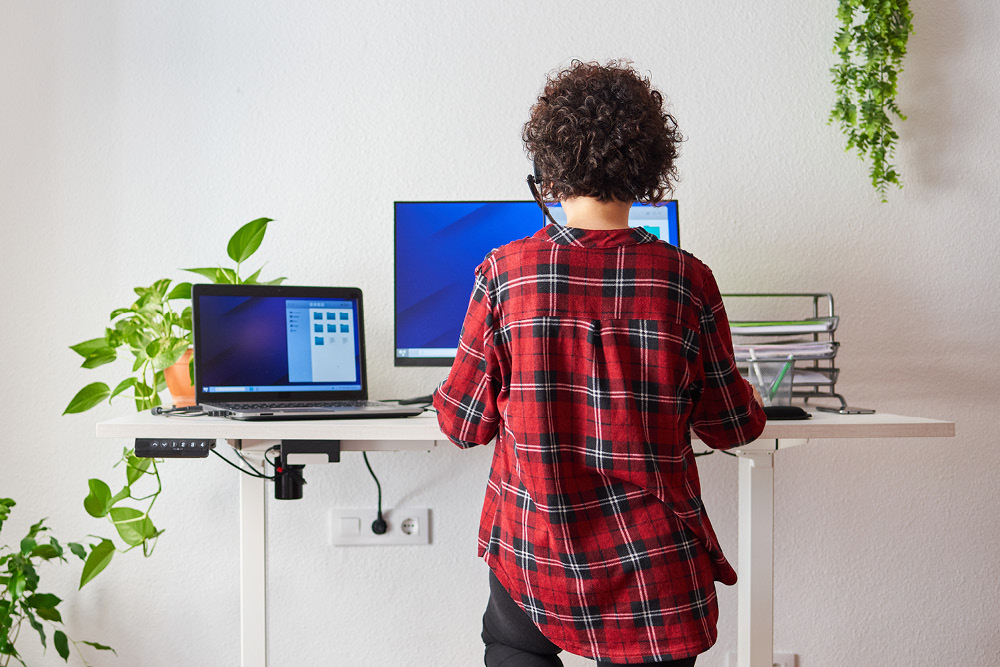
Our editorial consultant interviewed above, Rindu, would love a proper home office! She says:
“I bought a desk for the bedroom, but as my husband has frequent, long (and quite loud) work phone calls, he needed to take over that space and I ‘hot-desked’ - at the kitchen table, on the sofa when others were using the kitchen, perched on the edge of the bed, sometimes on the stairs when I needed space and quiet for Zoom calls. We have now sublet a separate small office space from a friend for him to use, so there’s a little more space for work now - during term time at least!”
While Posturite’s workstation assessors are hearing fewer tales of working on computers on beds and sofas… we can point out that the ability to change location and position to work is advantageous to your health and wellbeing. It’s all about the task since ergonomics is about designing and using the right environment for the task. Take a phone call standing up or on the sofa, but use a proper ergonomic workstation – with a standing desk a great option of course – to input into Display Screen Equipment.
There are downsides to spending more time with your children…
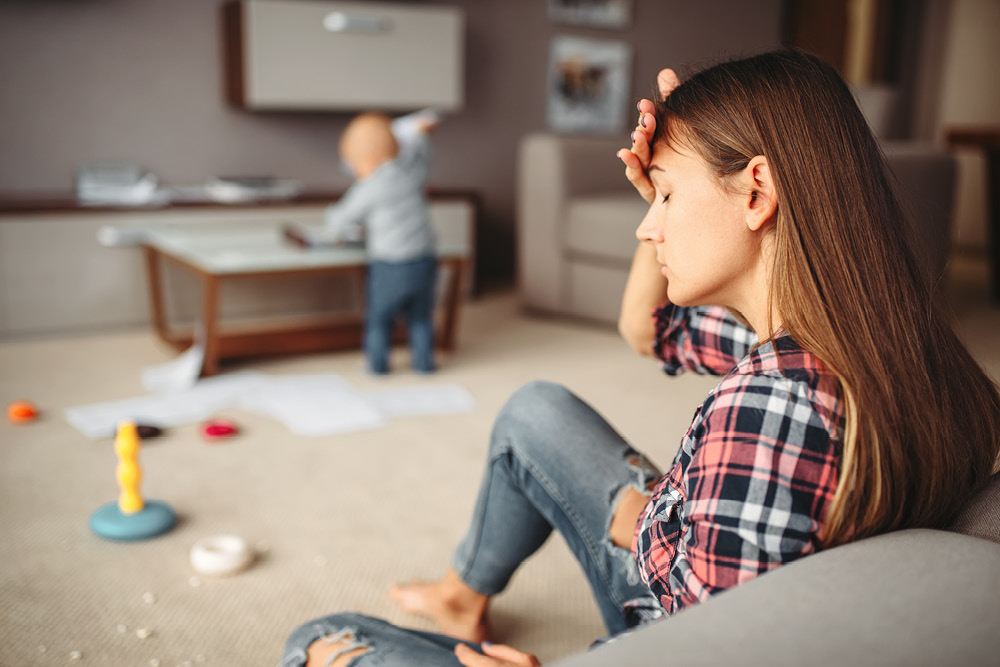
Don’t neglect your own needs. If you feel energised by spending days away from your children, potentially in a glamorous, big city work setting, be satisfied that’s what works for you. Your happiness will make you a better parent anyway.
Going stir-crazy in the school holidays
It’s August as I write this blog and I send a sympathetic slap on the back to every parent at this difficult time. Charity strategist Wayne tweeted a Gif of Kevin McCallister flying off the walls to represent his mid-school-holiday household:
“August really is the toughest month. 2 days in and I’m hanging on by my fingernails. Big love to all parents and carers!”
With the cost of living continuing to rise in 2022, the government set out new plans on 4 July 2022 with the aim of reducing childcare costs for 2-year-olds. It proposes changing required staff-to-child ratios from 1:4 to 1:5 for 2-year-olds which could potentially reduce the cost of this form of childcare by up to 15%.
Let’s talk productivity when you're not using childcare and you're working from home with an older child. Louise Goss, editor of The Homeworker magazine loved the tips from Joy Marchese, the author of 'Positive Discipline (for busy and overwhelmed parents)’ on how she communicates with her daughter so she can get work done and her daughter still feels involved and important.
Responsibility for smooth-running family life: which gender?
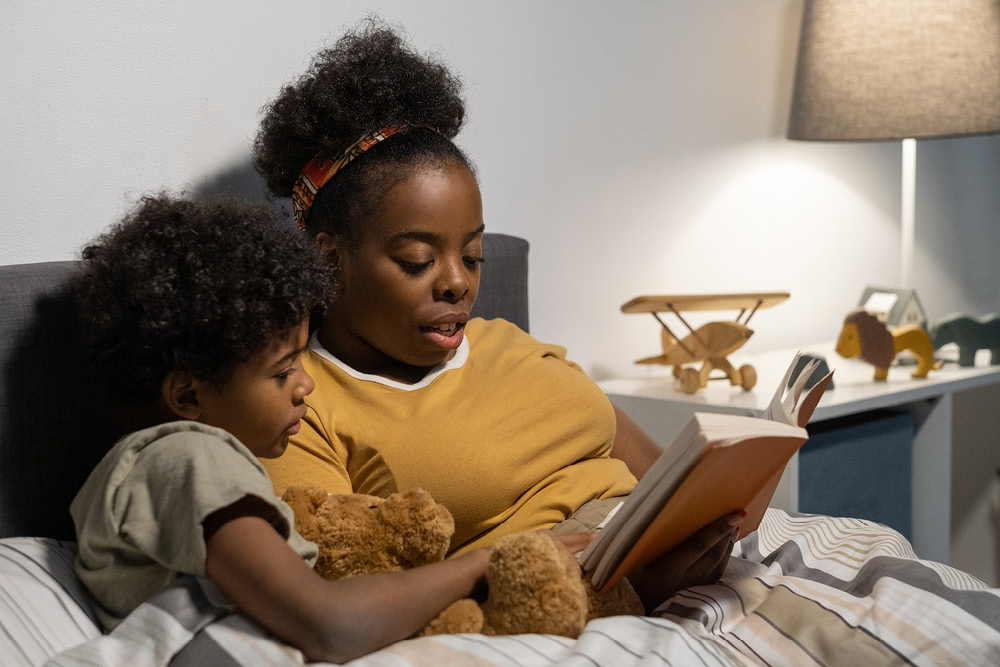
Does the established stereotype of the mother shouldering the burden of the practical and emotional tasks of bringing up a family still ring true? Not in my household, but apparently the research reported by BBC Worklife would point to the bulk of housework and childcare being delivered by Mums in many cases. You thought you were just Whatsapping Sheila around the corner to arrange when Finlay can go round to play, and researching when would be the least-hideous time to attempt the Clarks shoe shop mayhem, but apparently you were performing ‘cognitive and emotional labour’.
The shift in attitudes to family life
Hybrid working is a new working model which is here to stay. Nicole Mason, chief executive of the Institute for Women’s Policy Research in the US, told the Washington Post that Covid “helped companies see employees as people who have lives outside the office, rather than worker bees who fit the family obligations around their careers. We have a moment of reckoning, to reimagine a workplace that is actually more reflective of our lives.” She says it’s a shame it took a pandemic to get more of a work life balance.”
Read next: Which room do you use for homeworking? An infographic










